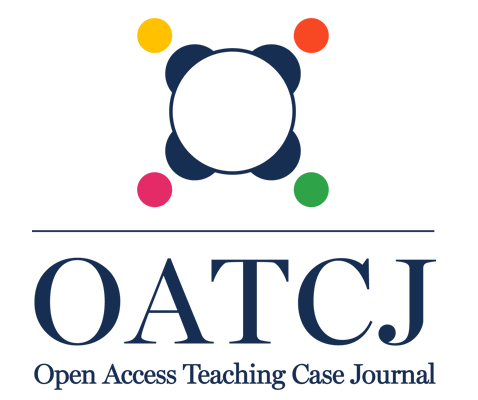Please note:
We are currently accepting case submissions. To submit a case, please see the case submission guidelines.
The Open Access Teaching Case Journal (OATCJ) publishes descriptive/evaluative or decision-based teaching case studies in all disciplines. Cases must be based on factual real-life occurrences that involve actual organizations and people (OATCJ does not accept fictional cases). Authors may choose to disguise the names (organizations or people) in the case. Previously published cases or articles (except those in proceedings or workshop presentations) are not eligible for consideration. There is no specific page limit expectation for the case submission, though shorter cases are preferred. The target audience for published case studies is students.
Cases are open access licensed, free to access and published free of charge. The costs involved with editing and publishing are covered by the host institution, Conestoga College.
All submissions are double-blind peer-reviewed by the OATCJ case research reviewers. Wherever possible, reviewers with subject matter expertise related to disciplines associated with submitted cases will be assigned. See the how to contribute as a reviewer section for information about becoming an OATCJ reviewer.
An instructor's manual (teaching notes) should be included with each case submission. See the case study and teaching note guidelines for more information about the required format for case teaching notes. All teaching notes will be made available to instructors on a vetted basis.
We are currently accepting case submissions. To submit a case, please see the case submission guidelines.
Contact OATCJ editors via email at oatcj@conestogac.on.ca.

About OATCJ
Strategic vision
“OATCJ is aligned with the United Nation's Principles of Responsible Management Education by offering a multi-disciplinary repository of quality, real-world teaching cases for students and instructors that are free and accessible to all. OATCJ provides rigorous and developmentally supportive peer-review process for case authors without the expectation of financial remuneration. OATCJ has a robust reviewer community from a broad spectrum of disciplines.
(SDG #4 Quality Education, SDG #10 Reduced Inequalities)”
Open access licenses for OATCJ
The OATCJ publishes cases exclusively using open licenses such as Creative Commons (CC) licenses. Applying a Creative Commons (CC) license to creative works helps creators retain some copyright “rights” while at the same time sharing their work with a clear indication of what others may and may not do with that shared work. The Open Access Teaching Case Journal (OATCJ) requires case writers to choose one of the open licenses. Creators will retain some rights to their creations.
Licensing the case study
Since cases are non-fictional events with non-fictional people, creators will want to choose a license that allows others to retain, reuse, and redistribute cases but not allow for revisions or remixes. The Creative Commons license choice is between CC-BY-NC-ND and CC-BY-ND. In both choices the creator retains some copyright rights for their creations and students are not required to pay. Once a Creative Commons license is applied to a work, it cannot be revoked.
CC-BY-NC-ND allows others to download and share the work if they give the creator attribution, do not make changes, or use it commercially.
CC-BY-ND allows others to download and share the work (even commercially) if they give the creator attribution and do not make any changes.
Creators may choose CC-BY-ND if they want to submit the case to a publisher journal. Keep in mind that publisher journals may not want to accept a work that has a CC-BY-ND license and has been published for free in an open journal.
Publisher journals typically require the creator to give up their rights to the work. This results in paywalls for the creators and their students. Once a creator has given up their rights to their work, they no longer have the right to apply an open license to that work.
Teaching notes
Teaching notes will be treated like test banks and faculty wishing access to teaching notes will be vetted and made aware that teaching notes are to remain confidential and not be redistributed. We ask that any requests for teaching notes be made to the OATCJ so that appropriate vetting and data collection for knowledge dissemination can be calculated. Once per year the reported adoptions and associated statistics about your case will be sent to you.
Please see the Creative Commons website for other open license choices.
The OATCJ
To access cases, please visit OATCJ: Open Access Teaching Case Journal, or our distribution partner, The Case Centre. Cases are available in HTML and PDF format. When linking to individual cases from Learning Management Systems or other classroom management software, please use the "permalinks" available for each case by right clicking on the case titles (or command button clicking with Macs), and selecting "copy link location".
Submission guidelines
Authors should submit their manuscripts using our online submission platform. All submissions must include a manuscript for the case study and a separate teaching note. Please carefully read the case study and teaching note guidelines before submitting your manuscript to avoid delays in the review process.
Submissions must include a release form signed by the authorized people within the organization referenced in the case. This case release form requirement also applies to the cases where names are disguised. The case release form is not required for cases developed using publicly available resources (published sources) or secondary sources instead of personal experience or interviews. The case release form will be distributed at the time of case publication. All sources are required for secondary source cases.
Case authors who submit cases for review at OATCJ will be asked to review cases in the future. This reciprocity is part of the scholarly process, and we very much appreciate your continued collaboration.
OATCJ publication and ethics policies
The Open Access Teaching Case Journal (OATCJ) is dedicated to upholding the highest standards of publication ethics. Our Publication Ethics Policy outlines the principles and procedures we follow to ensure academic rigour and publishing integrity, transparency, and accountability.
1. Allegations of misconduct
Process for handling allegations of misconduct:
- Receipt of allegation: Allegations can be submitted to the OATCJ Editorial Board via email to the oatcj@conestogac.on.ca email with the subject line ‘Allegation of misconduct’.
- Initial assessment: The editorial board will conduct a preliminary review during the next editorial board meeting to determine if the allegation has merit.
- Investigation: If warranted, an investigation committee will be formed, including members of the editorial board and external experts.
- Notification: The accused party will be informed of the allegation and given an opportunity to respond.
- Decision: The committee will review all evidence and make a decision. Possible outcomes include dismissal of the allegation, correction of the published work, or retraction.
- Communication: The decision will be communicated to all relevant parties, and a summary of the findings will be published if appropriate.
2. Authorship and contributorship
Authorship Policy:
- Criteria for authorship: Authorship, including co-authorship and author order, is determined by the manuscript submitter. In general, if someone substantively contributed towards the writing or editing of the manuscript then they can or should be included as a co-author.
- Acknowledgment of contributors: Individuals who contributed but do not meet authorship criteria should be acknowledged.
- Dispute resolution: In case of authorship disputes, the corresponding author should provide a detailed explanation of each author’s contribution. The editorial board will mediate if necessary.
3. Complaints and appeals
Complaints handling process:
- Submission: Complaints should be submitted in writing to the OATCJ via the oatcj@conestogac.on.ca email addressed to the OATCJ Editorial Board with the subject line ‘Complaint’.
- Acknowledgment: The complaint will be acknowledged within five (5) business days.
- Review: The complaint will be reviewed by the OATCJ Editorial Board during the next editorial board meeting.
- Resolution: A decision will be made within 30 days after the editorial board meeting, and the complainant will be informed of the outcome.
- Appeals: If the complainant is not satisfied, they may appeal to an independent ombudsperson appointed by the OATCJ Editorial Board.
4. Conflicts of interest / competing interests
Conflict of Interest Policy:
- Disclosure: Authors, reviewers, and editors must disclose any potential conflicts of interest.
- Endogeny: Editors and editorial board members must not author more than 25% of published cases in any of the last published two volumes or in any single calendar year.
- Management: Disclosed conflicts will be reviewed by the OATCJ Editorial Board. If necessary, alternative reviewers or editors will be assigned.
- Publication: All disclosed conflicts of interest will be published alongside the article.
5. Ethical oversight
Ethical Oversight Policy:
- Consent to publication: For cases based on the collection of primary data, authors must obtain written consent for publication from the focal organizations of their case. The signer of the written consent should have signing authority within the focal organization of the case. It is the author’s sole responsibility to ensure that consent is obtained.
- Confidential data: Confidential data must be handled in accordance with relevant privacy laws.
6. Intellectual property
Intellectual Property Policy:
- Plagiarism: It is the responsibility of the author to ensure that cases are written entirely using original content unless otherwise noted by appropriate referencing and citation. Plagiarism is not accepted.
- Author responsibilities: Authors must ensure that they have the rights to publish all text, images, figures and appendices from original content creators and provide appropriate and complete citations. Authors are required to follow the OATCJ submission requirements.
- Duplicate publication: Authors must confirm that their work is original and not under consideration elsewhere.
- Copyright infringement: Any issues of copyright infringement will be addressed promptly, with potential retraction of the work.
7. Journal management
Editorial Management Policy:
- Editorial independence: Editors are free from commercial influence and make decisions based on academic merit.
- Transparency: Editorial processes are transparent, and any changes to policies will be communicated to authors and readers.
- Financial cost: There is no cost to authors for publishing cases in the OATCJ. There is no cost to readers to access and use published cases in the OATCJ.
-
Editorial process:
- Initial review: The Editor-in-Chief evaluates each submission for adherence to the journal’s guidelines. Manuscripts that do not comply are returned to the authors.
- Assignment: If the submission meets the guidelines, the Editor-in-Chief either assumes responsibility for the manuscript or delegates it to a co-editor, if available.
- Preliminary evaluation: The assigned editor conducts a preliminary review of the manuscript. If deemed unsuitable for publication based on the journal’s policies, the manuscript is rejected.
- Peer review: For manuscripts that pass the preliminary evaluation, the editor assigns at least three reviewers with relevant expertise to assess the manuscript.
- Review outcomes: Upon receiving a minimum of three reviews, the editor decides whether to reject the manuscript, accept it, or request major or minor revisions from the authors.
- Developmental review: The journal adopts a developmental approach, which may involve multiple rounds of revisions and feedback between the authors and the editor before a final decision is reached.
- Final preparation: Once a manuscript is accepted, the editor forwards the final revised version to the publishing team for inclusion in the upcoming issue.
8. Peer review processes
Peer review Policy:
- Double-anonymous review: Both authors and reviewers remain anonymous to each other. Authors should remove personally identifiable information from their submissions, but editors may make minor changes to manuscripts to ensure author anonymity.
- Reviewer selection: Reviewers are selected based on the good fit of their subject matter expertise related to the submitted cases, and lack of conflicts of interest.
- Timeliness: Reviews should be completed within four (4) weeks. Extensions may be granted if necessary.
9. Post-publication discussions and corrections
Post-Publication Policy:
- Discussion: Readers are encouraged to submit comments and critiques of published work by sending an email to oatcj@conestogac.on.ca.
- Corrections: Comments will be assessed by editors, and errors identified post-publication will be corrected promptly. Minor errors will be corrected directly, while major errors may result in retraction. Corrections may be submitted by email to oatcj@conestogac.on.ca.
- Retractions: Retractions will be issued in cases of significant errors or misconduct, with a clear explanation provided.
How to contribute as a reviewer
The OACTJ is actively looking for contributors to act as reviewers and editors. As a multi-disciplinary journal, we are actively soliciting reviewer participation from a broad swath of scholarly disciplines. These may include disciplines outside of business and management studies. We invite those who have experience writing and reviewing pedagogical business cases based on real-world situations to apply.
To apply as a reviewer, please complete the OATCJ Reviewer Application Form, and we will send you a reviewer invitation.
Contact
To contact the editorial team at the Open Access Teaching Case Journal (OATCJ):
Email: oatcj@conestogac.on.ca
Phone: 1-519-748-5220, ext. 2148
Mail: OATCJ Editor, 299 Doon Valley Drive, Kitchener, Ontario N2G 4M4, Canada






